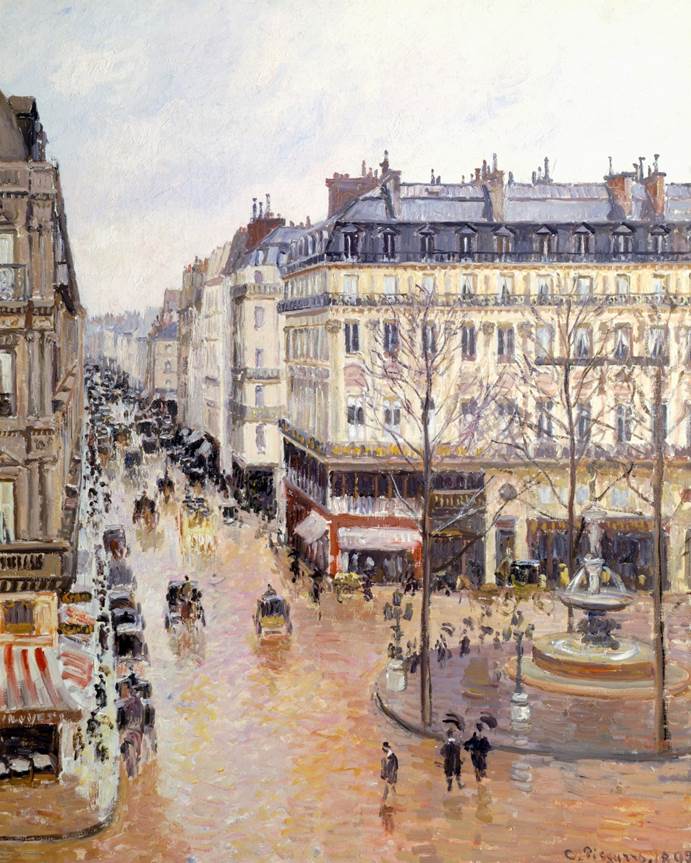I was pleased for the opportunity to chat with Larry Perel of KCRW in Santa Barbara about the significance of the recent ruling that the Thyssen-Bornemisza Museum in Madrid is the owner of Rue St. Honoré, effet de pluie by Camille Pissarro—notwithstanding that there was no dispute that it had been looted from the Cassirer by the Nazis. You can listen to the full audio of the radio broadcast here. I discussed the Cassirer case, the more recent decision by the United States Supreme Court not to hear further appeal of Marei von Saher’s lawsuit against the Norton Simon Museum, and other current issues concerning the restitution of Nazi-confiscated art claims. You can read more background on these cases here at the Art Law Report, or in A Tragic Fate—Law and Ethics in the Battle Over Nazi-Looted Art.
Radio Interview Examines Recent Nazi-Looted Art Court Decisions
Topics: Nazi-looted art, Marei Von Saher, Camille Pissarro, Art Law Report, A Tragic Fate, Thyssen-Bornemisza Museum, Rue St. Honoré effet de pluie, Nazi-confiscated art, Larry Perel, KCRW, Santa Barbara, Madrid
Thyssen-Bornemisza Prevails Over Cassirer Heirs' Claim to Pissarro Taken by Nazis Despite Acts “Inconsistent with the Washington Principles”
One of the longest-running court cases in the United States about art looted by the Nazis has been decided in favor of the current possessor, the Thyssen-Bornemisza Museum in Madrid, an instrumentality of the Kingdom of Spain. The U.S. District Court in Los Angeles ruled on April 30, 2019 against the heirs of Lilly Cassirer, a German Jew whom the Nazis targeted in 1939 for a forced sale of Rue Saint–Honoré, après-midi, effect de pluie (1892). The ruling is the second time that the museum has prevailed in the District Court as the owner of the painting under Spanish law, now on the grounds the museum did not know of the painting’s looting history when it acquired the work and that it held the work publicly for long enough to become its owner even though it had been stolen. The ruling, while favorable to the museum in this case, confirms important principles about the inability of successive possessors to acquire good title to artworks stolen by the Nazis, and the importance of diligence and pursuing questions raised by red flags in the chain of title. Notable as well was the Court’s pointed criticism of Spain for failing to adhere to the spirit of the Washington Principles on Nazi-Confiscated Art, and Spain’s failure to “comply with its moral commitments.”
Topics: Walter Feilchenfeldt, Third Reich, Terezin Declaration, Gestapo, Lilly Cassirer, Claude Cassirer, Jacques Goudstikker, Nazi-looted art, Czechoslovakia, Spain, Washington Principles, Baron Hans-Heinrich Thyssen- Bornemisza, A Tragic Fate, Law and Ethics in the Battle Over Nazi-Looted Art, Reichskammer der bildenden Künste, flight taxes, Rue Saint–Honoré, Julius Cassirer, Paul Durand-Ruel, Ludwigstrasse, Dr. Cassirer and Co. Kabelwerke, Jakob Scheidwimmer, Sydney Schoenberg, Hahn Gallery, Thyssen-Bornemisza Museum, Military Government Law No. 59, Reich Chamber of the Visual Arts, Ari Walter Kampf, Eugen Kampf, Knoedler & Co. Gallery, encubridor



